

Unclaimed: Are are working at Airtable ?
Airtable Reviews & Product Details
Airtable is a powerful visual project management platform that synergizes data, workflows, and execution teams on a unified dashboard. Streamlining work streams, the platform provides a synced and up-to-date information database that can be accessed by all stakeholders across different departments. Customization is at the heart of Airtable, allowing teams to create personalized apps and a tailored interface allowing easy access to relevant information and giving clear sightlines to the next steps. While customization is a key benefit, it also offers ready-to-use and pre-loaded industry-agnostic templates while extensive integrations and expandability make it scalable and agile.


| Capabilities |
API
|
|---|---|
| Segment |
Small Business
Mid Market
Enterprise
|
| Deployment | Cloud / SaaS / Web-Based, Mobile Android, Mobile iPad, Mobile iPhone |
| Support | 24/7 (Live rep), Chat, Email/Help Desk, FAQs/Forum, Knowledge Base, Phone Support |
| Training | Documentation |
| Languages | English |

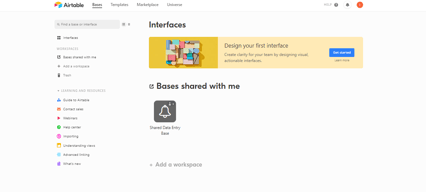
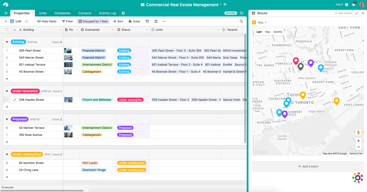
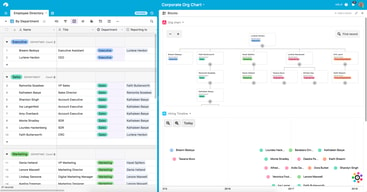
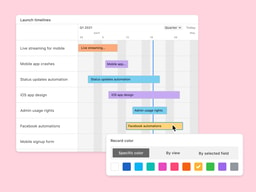
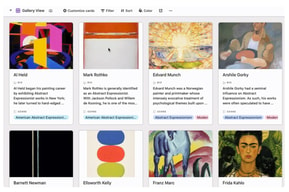
Compare Airtable with other popular tools in the same category.

I like the attractive, intuitive interface as we as the ease of onboarding new users.
Some of the simplicity leaves further customization off the table, but I think it is worth it to keep things clean and easy to use.
Airtable helps our team manage our workload, no matter where they are. We can make quick updates on the fly, which keeps the tool super fluid and relevant.
- data architecture - easy automations - easy interfaces for KPI's - always live data - everyone can work at the same time - you only need a browser, no instatllation
- you cannot color single cells or columns or lines
- reduce a huge number of Excel spreadsheets in one Airtable base - easy combination with softr (website builder) and make automation to other SW API's - the business performance increases significantly - you can save manpower that did not add value to your work (you don't need to copy/paste anymore)
It easily acts as a single source of truth so that everyone on a project's team has the visibility they need. It prevents duplicate work from being done and makes it simple to go back and get data when you're looking to evaluate the impact of your efforts.
Honestly, the pricing is the worst part. I think you all should move away from charging by the user because it's not realistic for agencies or large companies who have teams of people hopping in and out of airtable even if it's just to QA or get visibility into something, or peek at a branding doc, etc. Also, I think that Airtable has amazing capabilities but charging by the seat put all the pressure of maintenance on a single person or a few people. I bet AirTable is very underutilized by customers.
Keeping multiple projects for multiple client accounts organized. Unfortunately, because of the seat pricing, my clients are reluctant to use it and getting buy-in for them to utilize it is hard. It would work so much better is both were invested in it. Also, it makes running a content calendar so easy, and is great to catalog resources like ebooks, whitepapers, etc.
I love too many things about Airtable. Firstly I find it quite useful to organize and relate data. Sometimes you have to work with abstract connections between different data, and Airtable allows me to set a reference and define the rest of the parameters around them. Also, it's so helpful to have different ways to display the same information. In my office, we use personal and 'grouped' views to customize the content each person has to see. And of course being able to set a calendar, gallery or kanban view it's great to optimize some other tasks through a visual display. I wouldn't stop talking about features that I like...the extension for graphs, automations, the link with Miro, the general customization, the drag and drop function, filters, etc.
As I said before, I love the software so much...that's why sometimes I even expect (maybe) too much from it. But one of the things I find a bit tricky is that you can't create a group of blank records at once. In my job, sometimes I have to create 300 records which I will later be filling up, so creating them one by one it's a bit annoying. Also, I've seen the software change through time and evolve a lot; I've noticed it has many new functionalities and options that sound amazing (I know about them by reading the e-mails you send). In this aspect, it's a pity that my colleagues and I barely have time to check and investigate these new features, even if we are interested in them. So I think it would be helpful to have a more attractive, engaging and simple way to discover them without making a considerable effort (I know it could sound too picky, and it is! haha, I'm just trying to tell you how our experience is with the updates on the software).
As I said it before: organization and visualization of data. But also helps to manage our team and products (specially when talking about tech products). Airtable allowed us to scale up our production by helping to classify the information, connect data from the search along the whole process. From the research phase till the final publication and delivery to our users.
Airtable is incredibly easy to use. We're using the Airtable API to connect our backend to it - and then it so effortlessly allows us to connect to a multitude of other apps via Zapier. Saving us a lot of development effort. It syncs data on a live basis and allows us to feed that data into other applications. It is quick and easy to access, and can easily set up new workflows or tables. In addition, Airtable is a great software because it allows you to create custom applications without having to code. It also has a robust set of features that allow you to do everything from managing your to-do list to tracking your inventory.
There can be a little learning curve and there are just so many use cases for Airtable across the whole business, at times it can feel like you're spending your whole life on the platform. The possibilities are endless. Sometimes getting some integrations to work through Zapier can be a little tricky however. The UI can sometimes also be a little complicated, taking several steps to complete a simple task - and the dashboard is also not very customisable.
Allows us to connect and sync our data with numerous apps very quickly. We can also edit, update or add more data very easily. Airtable acts as our one source of truth for important data across the company.
Airtable gives me the ability to collect critical information from my geographically dispersed sales team and turn that information into actionable data - at a fraction of the cost of similar alternatives for my use case. And I love how easy it is to generate a virtually infinite variety of views of my data without having to worry about creating a problem with the underlying data.
Airtable doesn't handle printing well. Most of the time, it's not a big deal, but there are times that it's been very frustrating. And some elements of their subscription model are frustrating - two people who each have a Pro level account and have their own "workspace" cannot collaborate without one or the other paying for an additional user license.
I use my entire travel agency "back office" on Airtable. I use it to record sales for myself and my entire team, keep track of commissions from nearly 100 different suppliers, and track commission payments to sales agents.
User friendly. Most of it is self explanitory. I am able to streamline some of my work issues using Airtable. But I am still missing a few things that would make it even more user friendly. The interfaces needs some updates.
In order to send a form that is prefilled you need to change the whole address that you send to customers. But not everyone gets that link and you can't copy and paste it. You have to recreate it each time. super annoying.
We needed a CRM and it is working great for that. I'm still waiting for the forms to be able to view from right to left and that would be even better. But i see they are always improving.
Airtable gave me the opportunity to upgrade my small business operations from a pile of spreadsheets to an integrated ERP tailored to our needs for a fraction of the price of dedicated, ready-made software. It makes my work and my staff's easier, quicker, more organized and productive and on top of all that, with automations and integrations it takes lots of tasks off of our hands plus avoids mistakes
I wish there was an intermediate plan before enterprise to access more functionality.
From Bill of Materials for cost an price calculation and instant quotes on custom-made products, to planning and reporting of marketing actions and assets, through inventory, sales and purchases. Easy to use and create interfaces for every staff member
The degree to which I can customize anything I build in Airtable is incredible. I use it for archiving and workflows in my career, for budgeting and retaining documents at home, and even for organizing client portfolios when I freelance. It is incredible!
Like all powerful tools, Airtable requires a lot of experimentation to use it to its fullest capacity. While you can jump right in and create something useful in minutes, it takes considerable time to get the most value out of it.
My favorite use for Airtable is for saving information and documents that overlap into multiple categories so that no matter what grouping I'm looking at, I can find the information I need quickly and without having to search in half a dozen folders and subfolders. It saves me so much time!
Super easy to get started with and useful for so many things that you want to put everything in it
You will need to allow yourself some time to really think about your data -- both how to connect it (relationships) and how to pull it apart (normalizing it).
Gives us one unified source of truth for all our product data, and all our geographically-distanced team members easy self-serve access to that data.





